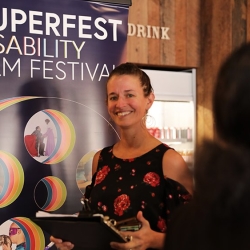
Emily Smith Beitiks
Alt text: Emily Beitiks, a white woman with brown hair pulled back, wears a floral shirt in front of a Superfest sign.
Biography
Emily Beitiks received a Ph.D. in American Studies with a focus in Disability Studies at the University of Minnesota. She has served as adjunct at the University of Minnesota, UC Santa Cruz, UC Davis, Menlo College and San Francisco State University. I her last job, she served as senior program associate for the Center for Genetics and Society, where she helped organize the Tarrytown Meetings for scholar-activism in biopolitics. She began at the Longmore Institute on Disability at San Francisco State University in 2012 as Associate Director and began servings as Interim Director in July 2022. In this role, she continues her work as a scholar and advocate of disability to showcase the way disability enriches our world. She was the project director for "Patient No More," a multimedia, interactive exhibit which modeled new standards for exhibit access, and she also serves as director for Superfest Disability Film Festival, the longest running disability film festival in the world.
Download CV: ESBEITIKS CV SFSU.doc
Website(s): LinkedIn